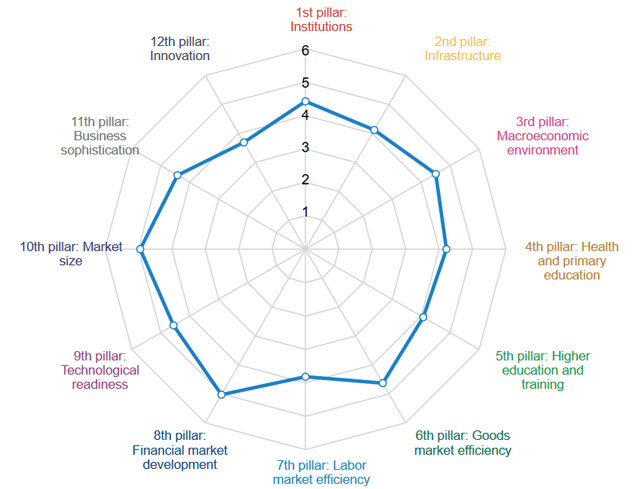
South Africa has climbed seven places in the latest World Economic Forum (WEF) competitiveness ratings, and it’s thanks to the country’s information and communications technology (ICT) sector.
The country is placed 49th in the Global Competitiveness Report 2015-2016, up seven places and reversing a four-year downward trend “thanks largely to increased uptake of ICTs, especially higher Internet bandwidth”, the WEF report said.
The report is an annual assessment of the factors driving productivity and prosperity in 140 countries.
South Africa has also scored well for improvements in innovation — climbing by five places from last year’s report to 38th place. This, according to the WEF, establishes the economy as the “region’s most innovative”.
According to the WEF report, South Africa also hosts Africa’s most efficient financial market (12th worldwide) and benefits from a sound goods market (38th), which is driven by strong domestic competition (28th) and an efficient transport infrastructure (29th).
“It further benefits from strong institutions (38th), particularly property rights (24th) and a robust and independent legal framework,” it said.
It’s not all good news, though.
“Reducing corruption (76th) and the burden of government regulation (117th) and improving the security situation (102nd) would further improve institutions,” the WEF report said.
“The country also needs to address its inefficient electricity supply (116th) and inflexible labour market (107th). Even more worrisome are health (128th) and the quality of education (120th), where higher secondary enrolment rates will not be enough to create the skills needed for a competitive economy.”
In the broader sub-Saharan African region, economic growth continues at close to 5%/year, but competitiveness and productivity remain low, according to the report.
“This is something countries in the region will have to work on, especially as they face volatile commodity prices, closer scrutiny from international investors and population growth.”
Mauritius remains the region’s most competitive economy (46th), followed by South Africa (49th) and Rwanda (58th). Côte d’Ivoire (91st) and Ethiopia (109th) excel as this year’s largest improvers in the region overall, the WEF said.

This year’s report, which was published on Wednesday, found a correlation between highly competitive countries and those that have either withstood the global economic crisis or made a swift recovery from it.
“The report’s Global Competitiveness Index (GCI) also finds a close link between competitiveness and an economy’s ability to nurture, attract, leverage and support talent. The top-ranking countries all fare well in this regard. But in many countries, too few people have access to high-quality education and training, and labour markets are not flexible enough.
“The failure, particularly by emerging markets, to improve competitiveness since the recession suggests future shocks to the global economy could have deep and protracted consequences.”
First place in the GCI rankings, for the seventh consecutive year, goes to Switzerland. “Its strong performance in all 12 pillars of the index explains its remarkable resilience throughout the crisis and subsequent shocks.”
Singapore remains in second place and the US third.
Germany improves by one place to fourth and the Netherlands returns to the fifth place it held three years ago.
Japan (sixth) and Hong Kong (seventh) follow, both stable. Finland falls to eight place — its lowest position ever — followed by Sweden (ninth). The UK rounds out the top 10. — (c) 2015 NewsCentral Media

